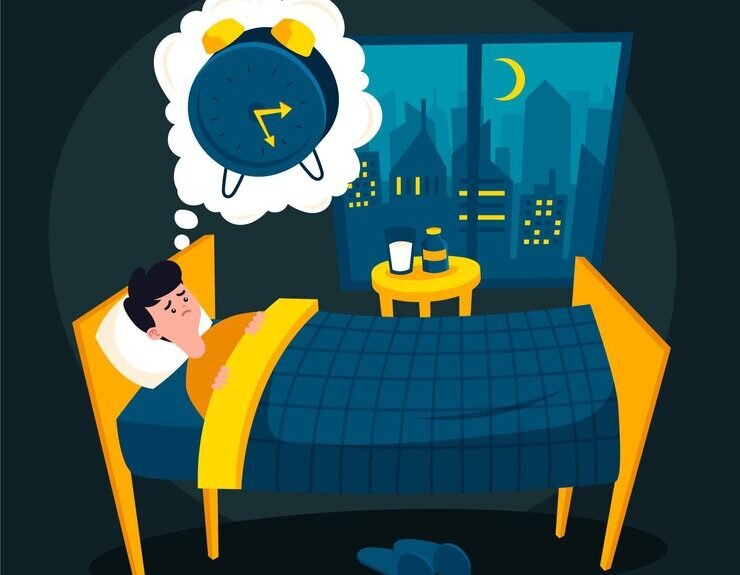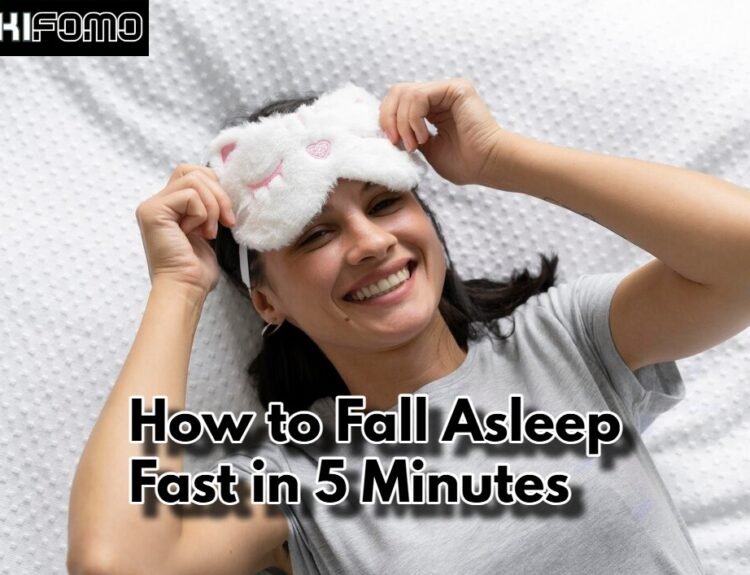Getting enough sleep as a teenager can feel like an uphill battle. Between school responsibilities, social pressures, and extracurricular activities, it’s easy for your sleep schedule to slip through the cracks. The good news is that you don’t have to suffer through sleepless nights. There are expert strategies that can help you fall asleep fast as a teenager, so you can get the rest you need to thrive. In this guide, we’ll walk you through some proven tips to help you improve your sleep habits and set yourself up for better rest.
1. Create a Sleep-Friendly Environment: Keep Your Bedroom Quiet and Dark

One of the first steps in learning how to fall asleep fast as a teenager is optimizing your bedroom environment. If your room is too bright or noisy, it can prevent you from drifting off quickly. The right environment promotes faster sleep and better rest.
ALSO READ: Supplements to Increase Deep Sleep: Natural Remedies for Better Rest
- Block out light: Light interferes with your body’s production of melatonin, a hormone that helps regulate sleep. To ensure you fall asleep fast as a teenager, make your room as dark as possible. Use blackout curtains or a sleep mask, and cover any lights from your alarm clock or electronics.
- Reduce noise: A quiet room promotes better sleep. Ask your family to keep the noise level down, especially if you’re trying to go to bed early. If noise is unavoidable, try using earplugs or a white noise machine to mask sounds.
2. Set Your Thermostat to a Cool Temperature for Better Sleep

Your body temperature can directly affect how fast you fall asleep as a teenager. If your room is too hot or too cold, your body may have difficulty relaxing into sleep.
- Ideal temperature: To help you fall asleep fast as a teenager, keep your room at a cool, comfortable temperature—between 60-67°F (15-19°C). This allows your body to cool down naturally, signaling to your brain that it’s time for rest.
- Use a fan or open a window: If your room feels too warm, try using a fan or opening a window to cool it down.
3. Wind Down with Relaxing Activities Before Bed

Relaxation before bed is crucial if you want to fall asleep fast as a teenager. Avoid high-energy activities right before bedtime, as they can make it difficult for your body to relax. Instead, engage in activities that signal to your brain that it’s time to unwind.
- Journaling: Writing in a gratitude journal or listing things you’re excited about can calm your mind and prepare you for sleep.
- Stretching or Yoga: Gentle stretching or light yoga helps release tension in your body and promotes relaxation, making it easier to fall asleep fast as a teenager.
- Breathing exercises: Deep breathing techniques can help lower anxiety and stress, making it easier for your body to relax.
4. Limit Screen Time Before Bed: A Key to Falling Asleep Fast

If you’re trying to fall asleep fast as a teenager, one of the most important changes you can make is reducing screen time before bed. The blue light emitted by phones, laptops, and other devices can interfere with melatonin production, making it harder for you to fall asleep quickly.
- Avoid screens: To ensure you fall asleep fast as a teenager, stay away from screens at least 1-2 hours before bedtime. Try reading a book, listening to calming music, or engaging in other relaxing activities that don’t involve screens.
5. Snack Wisely Before Bed: Avoid Eating Too Much or Too Little

Teens often have high metabolisms, which means you might get hungry before bed. If your stomach is rumbling, it can be difficult to fall asleep fast as a teenager. However, eating the wrong foods can also disrupt your sleep. The key is to eat a light, healthy snack that supports sleep without causing discomfort.
- Good snack options: A small snack with complex carbohydrates and a bit of protein can help. Try peanut butter on whole-grain toast, cereal, or graham crackers for a satisfying, sleep-friendly snack.
6. Aromatherapy: Relax Your Mind and Body Before Sleep

Aromatherapy can be a great way to calm your mind and body, helping you fall asleep fast as a teenager. Certain essential oils are known for their relaxing and sleep-inducing properties, which can help you wind down at night.
- Lavender and chamomile: These essential oils are known to reduce stress and promote relaxation, making them great choices for helping you fall asleep fast as a teenager.
- Peppermint or eucalyptus: These oils can also clear your airways, preventing disturbances during the night and helping you sleep soundly.
7. Stick to a Consistent Sleep Schedule

A consistent sleep schedule is essential if you want to fall asleep fast as a teenager. Your body’s internal clock thrives on routine, and going to bed and waking up at the same time each day helps regulate your sleep-wake cycle.
- Set a bedtime: Make it a habit to go to bed at the same time each night. Even on weekends, aim for consistency.
- Wake up at the same time: Set an alarm to wake up at the same time every day. This regularity helps your body establish a natural rhythm, making it easier to fall asleep fast as a teenager.
8. Avoid Late Afternoon Naps

While naps can be a helpful way to recharge, taking long naps late in the afternoon can make it harder to fall asleep fast as a teenager at night. If you take a nap too late in the day, it can throw off your sleep schedule.
- Nap early: Keep naps to 30-45 minutes and try to finish them by 3 or 4 p.m. This gives your body time to feel sleepy before your designated bedtime.
9. Exercise Regularly: Physical Activity for Better Sleep

Exercise plays a significant role in helping you fall asleep fast as a teenager. Physical activity reduces stress, burns off extra energy, and makes your body more likely to rest deeply at night.
- Morning or afternoon workouts: Exercise earlier in the day to avoid the adrenaline rush that could make it difficult to sleep. Regular physical activity helps you fall asleep faster and experience deeper, more restorative sleep.
- Light evening exercise: If you must exercise in the evening, opt for low-impact activities like walking or stretching. Avoid intense workouts too close to bedtime.
10. Cut Down on Caffeine: Avoid Stimulants Late in the Day

Caffeine is a stimulant that can prevent you from falling asleep fast as a teenager. Whether you’re drinking coffee, soda, or energy drinks, consuming caffeine late in the day can interfere with your sleep quality.
- Cut off caffeine by 2 p.m.: To ensure caffeine doesn’t disrupt your sleep, stop consuming it in the early afternoon. Even small amounts of caffeine can linger in your system for hours, so avoid drinking it after 2 p.m.
11. Manage Stress to Fall Asleep Faster

Stress and anxiety are common sleep disruptors for teenagers. Worrying about school, friends, or future plans can keep your mind racing, making it difficult to fall asleep fast as a teenager.
- Practice mindfulness: Techniques such as deep breathing, yoga, or meditation can help calm your mind and reduce anxiety.
- Set aside time for hobbies: Engaging in activities that bring you joy like playing a musical instrument, drawing, or reading can also help alleviate stress and prepare you for restful sleep.
12. Take Advantage of Natural Light Throughout the Day

Natural light plays a crucial role in regulating your circadian rhythm and helping you fall asleep fast as a teenager. Exposure to sunlight during the day helps your body maintain a healthy sleep-wake cycle, making it easier to fall asleep at night.
- Morning sunlight: As soon as you wake up, try to expose yourself to natural light by opening your curtains or stepping outside for a few minutes.
- Maximize daylight hours: If possible, spend time outdoors during the day to get more natural sunlight. This helps keep your body’s internal clock on track, improving your ability to fall asleep fast at night.
13. Use Relaxing Activities If You Can’t Sleep

Sometimes, you may find yourself lying awake in bed, unable to fall asleep fast as a teenager. Instead of stressing about it, try using a relaxing activity to calm your mind and body.
- Read a book: Pick up something light or soothing to read.
- Try a calming hobby: Engage in a simple activity like knitting, doodling, or solving a puzzle to take your mind off stress and help you relax.
14. Aim for 8-10 Hours of Sleep Every Night

Teenagers need more sleep than adults—usually 8 to 10 hours of sleep each night. Getting enough sleep is essential for your growth, cognitive function, and emotional well-being.
- Prioritize sleep: Make sleep a priority by sticking to a healthy routine and getting the right amount of rest each night.
15. Talk to a Doctor if Sleep Problems Persist

If you’ve tried everything and still struggle to fall asleep fast as a teenager, it might be time to consult a healthcare provider. Sleep disorders or underlying issues like anxiety or depression can significantly impact your ability to get good rest.
- Seek professional help: A doctor can recommend treatment options such as therapy or medications to help you improve your sleep.
Final Thoughts
Learning how to fall asleep fast as a teenager isn’t just about finding the right technique it’s about building healthy habits that promote better sleep over time. By adjusting your environment, setting a consistent routine, and addressing stress and diet, you can improve your chances of getting the restful sleep you need to feel energized and focused. Remember, good sleep is a key part of maintaining overall health, so prioritize it in your daily life.
Love what you read? Join our community! Like, share, and follow Wikifomo for more exciting insights. Your support encourages our passion! Thank You.
FAQ
How can I fall asleep fast as a teenager?
Try creating a relaxing environment, setting a consistent bedtime, limiting screen time, and practicing relaxation techniques like meditation.
How do I fix my sleep schedule as a teenager?
Establish a regular bedtime and wake time, even on weekends. Exposure to natural light in the morning and reducing naps can also help reset your sleep cycle.
Does exercise help me fall asleep faster?
Yes, regular exercise helps tire your body and promotes deeper sleep. Just be sure to avoid intense workouts too close to bedtime.
How can I stop worrying at night and fall asleep fast?
Try mindfulness techniques, deep breathing, or journaling to manage stress and calm your mind before bed.
What should I do if I can’t fall asleep?
If you can’t sleep, avoid stressing out. Instead, engage in a calming activity like reading, solving puzzles, or listening to soothing music.



